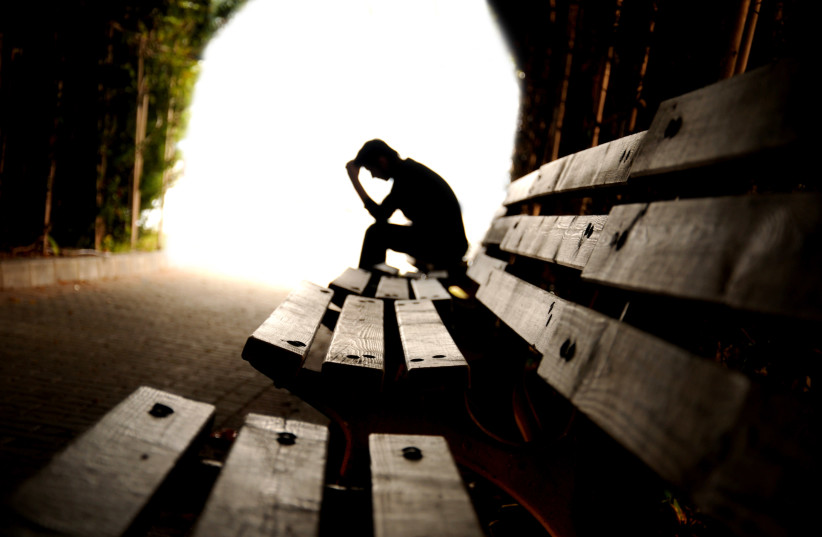Those in Israel who were most affected by the massacre in the south by Hamas terrorists on October 7 and the resulting Hamas war were women and young people, according to a new survey conducted for the Pa’amonei Ruah (Wind Chimes) organization by the Geocartography Institute.
The survey showed that 67% felt psychological harm as a result of the war. In this context, it should be noted that the damage is similar among the Jewish population and the Arab population in Israel. It also shows that one out of every five Israelis and one out of four women and young people are interested in undergoing mental health treatment or have already started such treatment.
The survey was conducted in the second week of February among 402 respondents aged 18 and over, who are a representative sample of the entire Israeli population. The survey shows that 67% of the respondents answered that they experienced psychological damage as a result of the war.
Eight percent of the respondents said that after the war began, they had already started mental health treatments. A total of 13% answered that they became interested in mental therapy but had not yet started it. About 46% of the respondents answered that they felt psychological damage following the war but were not interested in mental health treatment.
This is especially noticeable among women: 84% of the female respondents answered that they had experienced mental harm, and 24% answered that they had already sought mental help or had become interested in it.

In contrast, only half of the men reported mental harm, and only 19% of the men were interested in or started mental therapy. Another population that reported significant mental damage as a result of the war is the young population, ages 18-34.
Of the young people, 71% reported mental harm. A quarter are interested in or have already started mental therapy. By contrast, only 46% of the older population, aged 55 and over, reported psychological harm, and only 10% of them were interested in or had started treatment.
Although signs stated that “Together we will win!” are plastered everywhere, the surveyors said there has been no increase in the feeling of solidarity towards other sectors. A surprising phenomenon that emerges from the survey is that there has been no growth among Israelis in the sense of solidarity with groups that are sometimes considered vulnerable, including women, children, and the elderly.
Those groups seem to have had great public pressure for their initial release from Hamas captivity. To the question, “Did the war affect your solidarity with children?” only about 52% answered that it did; 46% answered that it did not change, and about two percent even answered that it decreased. 48% answered that their level of solidarity with the elderly had increased, compared to 50% who answered that it had not changed. Just 46% answered that their level of solidarity with women had increased,
In this context, it should be noted that those who reported mental harm as a result of the war became much more empathetic to the various groups.
The survey also shows that 21% of the respondents answered that they avoided going to mental health treatment as a result of a lack of available therapists. About a quarter (26%) of those who reported mental harm answered that they avoided going to mental health care because of the shortage.
Caring for animals can help reduce stress
Care for animals can greatly help people who have experienced distress themselves, according to Pa’amonei Ruah, a voluntary organization that promotes mutual care of people and animals. The association operates a shelter for animals in Kfar Saba and brings together animals and people, thereby enabling the process of mutual rehabilitation of animals and children, teenagers, and adults who have suffered trauma.
These days, dozens of women and men who experienced an outbreak of post-traumatic stress as a result of the war are being treated by the association, including many who underwent sexual and other abuses many years ago and whose anxiety has again been triggered. When the patients themselves take care of various animals, such as dogs, cats, hamsters, geese, and others, they feel better. The survey showed that about 89% of the respondents answered that caring for animals can greatly help people who have experienced adversity themselves.
Dr. Noam Rudich, who founded the association, explains that the ground has dropped out from under all of us. We have lost trust in humans, in others, and also in those who are supposed to protect us. “But we are left with a need for some kind of connection for comfort. Therefore, animals can become a reliable relationship and more, and certainly less disappointing than the human relationship, as happened on October 7. A relationship with animals is very rewarding, and those who choose to see them as partners can be filled with a new sense of meaning. Pets themselves need us and want to be near us.”
According to her, when we create a real relationship with the animals, a relationship in which there is room for the needs and desires of both parties, we create a new and essential experience about all the events of war where there is no place for the basic human needs and desires.
